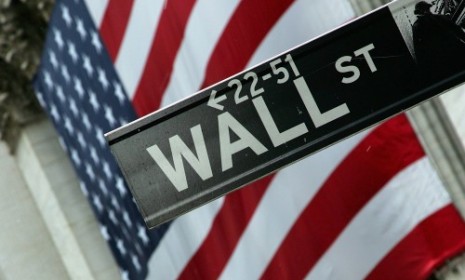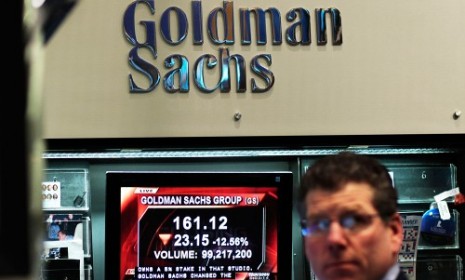Financial reform: 5 things you need to know
Do your eyes glaze over when you hear the phrase "financial reform"? Here's a crib sheet

A free daily email with the biggest news stories of the day – and the best features from TheWeek.com
You are now subscribed
Your newsletter sign-up was successful
The Senate is poised for a showdown over a broad financial reform bill that would ramp up regulation of banks and investment firms, clamp down on speculative trading of financial derivatives, and increase consumer protections, among other changes. The basics about this complex piece of legislation:
1. Where we stand today
The House passed its version of financial reform in December, 223-202, with no GOP votes. The Senate will start debating its version soon, probably next week, depending on how renewed bipartisan negotiations progress. The Senate Finance Committee cleared the bill along party lines, and the Agriculture Committee on Wednesday passed a derivatives-regulation proposal by Sen. Blanche Lincoln (D-AR) that observers call surprisingly tough on banks.
The Week
Escape your echo chamber. Get the facts behind the news, plus analysis from multiple perspectives.

Sign up for The Week's Free Newsletters
From our morning news briefing to a weekly Good News Newsletter, get the best of The Week delivered directly to your inbox.
From our morning news briefing to a weekly Good News Newsletter, get the best of The Week delivered directly to your inbox.
2. Public opinion backs reform
Recent polls show a majority or plurality of Americans backing financial reform. A Pew poll in March found 59 percent support, while an April 17-18 Gallup poll was closer: voters backed giving the government new powers to "regulate large banks and financial institutions" by a 46-43 percent margin, but they approved of new powers to "regulate Wall Street banks" 50 percent to 36 percent. Unlike with health care reform, the Tea Party movement doesn't seem upset about financial reform, reports Benjamin Sarlin in The Daily Beast.
3. Who's fighting the bill?
The U.S. Chamber of Commerce, most of Wall Street, and — up to a point, anyway — the GOP. Wall Street opposes several provisions, including Lincoln's derivatives measure, which would put a heavy damper on speculative trading of oil futures and other derivatives. But other elements of the bill enjoy industry support: Citigroup CEO Vikram Pandit is backing the bill's consumer protection agency, and smaller community banks back the proposed $50 billion large-bank liquidation fund. At the other end of the spectrum, some prominent liberals don't think the bill does enough to rein in Wall Street.
A free daily email with the biggest news stories of the day – and the best features from TheWeek.com
4. Will any Republicans vote for the bill?
The future of the measure may hinge on that question. If even one GOP senator does vote for it, the Democrats (if they can retain all 59 members of their own caucus) will be able to block a fillibuster. Despite the fact that all 41 GOP senators have signed a pledge to oppose the bill as is, the White House is still actively courting at least three: Sens. Olympia Snowe (R-ME), Susan Collins (R-ME), and Bob Corker (R-TN). Some commentators, including Nobel Prize-winning economist Paul Krugman, think the Democrats are gullible in their expectation of getting even one Republican vote.
5. The bank-liquidation fund may be cut
The White House signaled that the $50 billion, industry-funded pool to liquidate too-big-to-fail banks (up to $150 billion in the House version) may be dropped to win Republican support. McConnell blasted the proposal last week, saying it "not only allows for taxpayer-funded bailouts of Wall Street banks; it institutionalizes them.” Obama called McConnell "cynical and deceptive" for misrepresenting the fund, and McConnell has backed down. Senate Democrats say they won't drop the provision unless they're sure it will net some GOP votes.
-
 James Van Der Beek obituary: fresh-faced Dawson’s Creek star
James Van Der Beek obituary: fresh-faced Dawson’s Creek starIn The Spotlight Van Der Beek fronted one of the most successful teen dramas of the 90s – but his Dawson fame proved a double-edged sword
-
 Is Andrew’s arrest the end for the monarchy?
Is Andrew’s arrest the end for the monarchy?Today's Big Question The King has distanced the Royal Family from his disgraced brother but a ‘fit of revolutionary disgust’ could still wipe them out
-
 Quiz of The Week: 14 – 20 February
Quiz of The Week: 14 – 20 FebruaryQuiz Have you been paying attention to The Week’s news?
-
 The FBI and DHS reportedly warned Trump of a possible rise in white nationalist extremism in May
The FBI and DHS reportedly warned Trump of a possible rise in white nationalist extremism in MaySpeed Read
-
 Walmart's explosive Mexican bribery scandal: A concise guide
Walmart's explosive Mexican bribery scandal: A concise guidefeature The New York Times reports that Walmart allegedly paid at least $24 million in bribes to become a dominant retailer in Mexico
-
Starbucks: Coffee, tea, and beer?
feature Hit hard by the recession and fast-food competitors, the coffee giant is testing the idea of selling alcohol — but will it turn off core customers?
-
 The case against Goldman Sachs: A guide
The case against Goldman Sachs: A guidefeature Why the SEC is going after the Wall Street powerhouse, and what it means for the financial industry
-
 Black, black Friday
Black, black Fridayfeature A death at Walmart: When shopping fervor goes too far